
The O'Jays are an American R&B group from Canton, Ohio, formed in 1958 and originally consisting of Eddie Levert, Walter Lee Williams, William Powell, Bobby Massey and Bill Isles. The O'Jays made their first chart appearance with the minor hit "Lonely Drifter" in 1963, but reached their greatest level of success once Gamble & Huff, a team of producers and songwriters, signed them to their Philadelphia International label in 1972. With Gamble & Huff, the O'Jays emerged at the forefront of Philadelphia soul with "Back Stabbers" (1972), and topped the US Billboard Hot 100 the following year with "Love Train". Several other US R&B hits followed, and the O'Jays were inducted into the Vocal Group Hall of Fame in 2004, The Rock and Roll Hall of Fame in 2005, and the Rhythm and Blues Music Hall of Fame in 2013.
Bertrand Russell Berns, also known as Bert Russell and (occasionally) Russell Byrd, was an American songwriter and record producer of the 1960s. His songwriting credits include "Twist and Shout", "Piece of My Heart", "Here Comes the Night", "Hang on Sloopy", "Cry to Me" and "Everybody Needs Somebody to Love", and his productions include "Baby, Please Don't Go", "Brown Eyed Girl" and "Under the Boardwalk".

The Dixie Cups are an American pop music girl group of the 1960s. They are best known for a string of hits including their 1964 million-selling record "Chapel of Love", "People Say", and "Iko Iko".

Lamont Herbert Dozier was an American singer, songwriter, and record producer from Detroit, Michigan. He co-wrote and produced 14 US Billboard number-one hits and four number ones in the UK.

Benjamin Earl King was an American soul and R&B singer and record producer. He is best known as the singer and co-composer of "Stand by Me"—a U.S. Top 10 hit, both in 1961 and later in 1986, a number one hit in the United Kingdom in 1987, and number 25 on the RIAA's list of Songs of the Century—and as one of the principal lead singers of the R&B vocal group The Drifters, notably singing the lead vocals of one of their biggest global hit singles, "Save the Last Dance for Me". Besides "Stand By Me”, his songs "There Goes My Baby" and "Spanish Harlem" also appeared on the Rock and Roll Hall of Fame's list of 500 Songs That Shaped Rock and Roll.

Bert Kaempfert was a German orchestra leader, multi-instrumentalist, music producer, arranger, and composer. He made easy listening and jazz-oriented records and wrote the music for a number of well-known songs, including "Strangers in the Night", “Danke Schoen” and "Moon Over Naples".
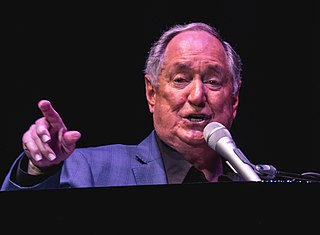
Neil Sedaka is an American pop singer and pianist. Since his music career began in 1957, he has sold millions of records as a performer and has written or co-written over 500 songs for himself and others, collaborating mostly with lyricists Howard "Howie" Greenfield and Phil Cody.

Thomas Jefferson Edwards was an American singer and songwriter. His most successful record was the multi-million-selling song "It's All in the Game", becoming the first African-American to reach No. 1 on the Billboard Hot 100.
The Adult Contemporary chart is published weekly by Billboard magazine and lists the most popular songs on adult contemporary radio stations in the United States. The chart is compiled based on airplay data submitted to Billboard by stations that are members of the Adult Contemporary radio panel. The chart debuted in Billboard magazine on July 17, 1961. Over the years, the chart has gone under a series of name changes, being called Easy Listening(1961–1962; 1965–1979), Middle-Road Singles(1962–1964), Pop-Standard Singles(1964–1965), Hot Adult Contemporary Tracks(1979–1982) and Adult Contemporary(1983–present).

"Surfin' Safari" is a song by American rock band the Beach Boys, written by Brian Wilson and Mike Love. Released as a single with "409" in June 1962, it peaked at number 14 on the Billboard Hot 100. The song also appeared on the 1962 album of the same name.
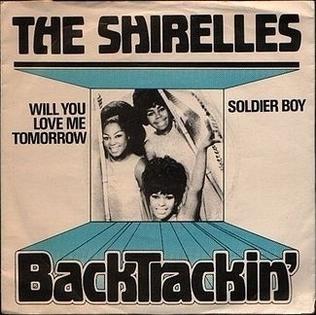
"Will You Love Me Tomorrow", sometimes known as "Will You Still Love Me Tomorrow", is a song with words written by Gerry Goffin and music composed by Carole King. It was originally recorded in 1960 by the Shirelles at Bell Sound Studios in New York City, with this version going to number one on the Billboard Hot 100 chart. The song is also notable for being the first song by a black all-girl group to reach number one in the United States. It has since been recorded by many artists over the years, including a 1971 version by co-writer Carole King.
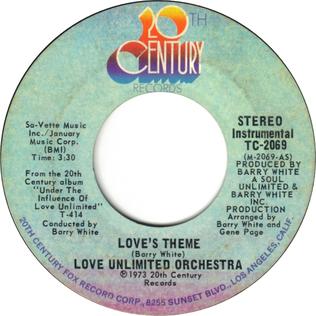
"Love's Theme" is an instrumental piece written by Barry White in around 1965, and recorded and released as a single by White's The Love Unlimited Orchestra in 1973. It is one of the few instrumental and purely orchestral singles to reach No. 1 on the Billboard Hot 100 chart in the United States, which it did in early 1974. Billboard ranked it as the No. 3 song for 1974. The piece was included on two albums: 1973's Under the Influence of... Love Unlimited and 1974's Rhapsody in White by the Love Unlimited Orchestra.

Joanie Sommers is an American singer and actress with a career concentrating on jazz, standards and popular material and show-business credits. Once billed as "The Voice of the Sixties", and associated with top-notch arrangers, songwriters and producers, Sommers' popular reputation became closely tied to her biggest, yet most uncharacteristic, hit song, "Johnny Get Angry".
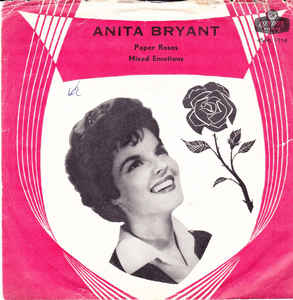
"Paper Roses" is a popular song written and composed by Fred Spielman and Janice Torre. It first was a top five hit in 1960 for Anita Bryant. Marie Osmond recorded it in 1973 and took her version to number one on the US country chart.
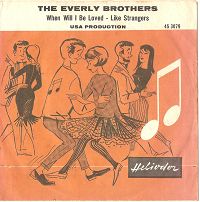
"When Will I Be Loved" is a popular song written by Phil Everly of the Everly Brothers, who had a US top-ten hit with it in 1960. Linda Ronstadt covered the song in 1975, and her version was an even bigger hit in the US, peaking at No. 2. Vince Gill also covered it in 1994 on the soundtrack of the film 8 Seconds.

"I Love How You Love Me" is a song written by Barry Mann and Larry Kolber. It was a 1961 Top Five hit for the pop girl group The Paris Sisters, which inaugurated a string of elaborately produced classic hits by Phil Spector. Bobby Vinton had a Top Ten hit in 1968 with a cover version. The song has been recorded by many other artists over the years.
A girl group is a music act featuring several female singers who generally harmonize together. The term "girl group" is also used in a narrower sense in the United States to denote the wave of American female pop music singing groups, many of whom were influenced by doo-wop and which flourished in the late 1950s and early 1960s between the decline of early rock and roll and start of the British Invasion. All-female bands, in which members also play instruments, are usually considered a separate phenomenon. These groups are sometimes called "girl bands" to differentiate, although this terminology is not universally followed.
"Right or Wrong" or "Right or Wrong " is a song written and originally recorded by Wanda Jackson, an American country, rock, and Christian music artist. Originally, the song was a major country and pop hit for Jackson in 1961. A second version was released in 1964 that became popular by American pop artist, Ronnie Dove.
"Portrait of My Love" is a song written by Norman Newell and Cyril Ornadel, which was released by Matt Monro in 1960, and was an international hit for Steve Lawrence in 1961.
Bell Sound Studios was an independent recording studio in New York City from 1950 to 1976. At its height, the studio was the largest independent recording studio in the United States, and the site of recording sessions that produced seminal hits by Frankie Lymon & The Teenagers, the McGuire Sisters, The Flamingos, Dion and the Belmonts, Paul Anka, Frankie Avalon, the Drifters and Ben E. King, The Four Seasons, Lesley Gore, the Dixie Cups, The Everly Brothers, Buddy Holly, and Kiss.














